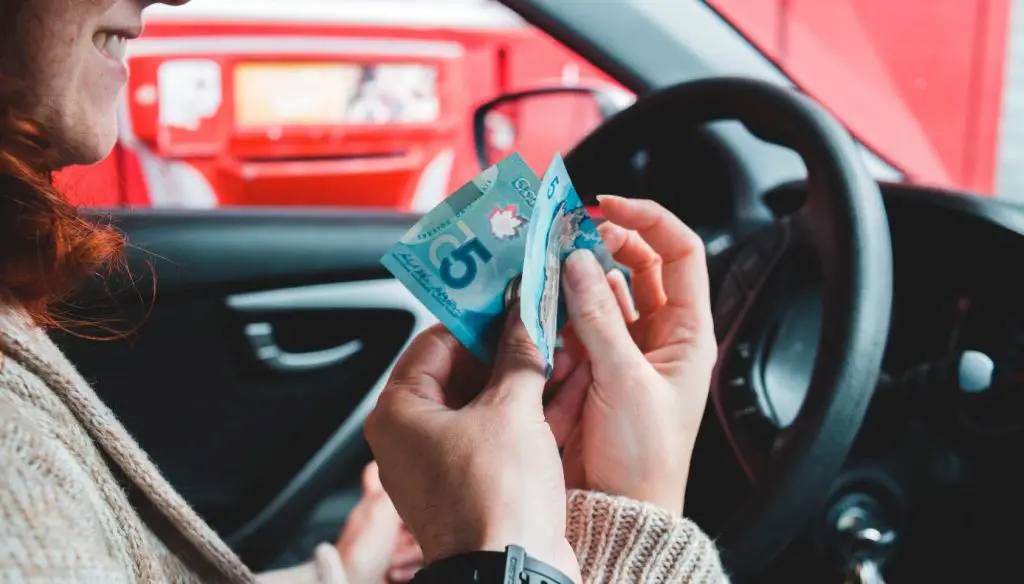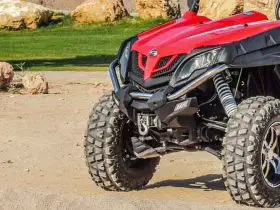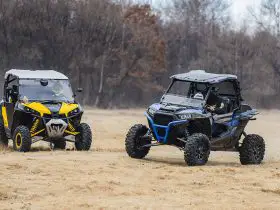Calculating the total expenditure of a UTV before making a purchase is one of the most important things to do since it ensures that you buy a UTV within your budgeted cost. The initial market price of the car and other additional costs such as maintenance and expenditure costs are a factor to consider before buying your UTV. Buying a UTV vehicle within your budget range ensures that you don’t struggle during your car ownership. Let’s delve into the other costs!
Table of Contents
Calculate licensing costs
Various states have varying license restrictions for UTVs. Before buying a UTV car, consider the age restrictions first to determine whether your age limit is within the restricted age by the state. Different buyers look forward to buying UTVs for various purposes e.g., using it as a sports vehicle, recreation, or even transportation of goods. Licensing costs charged vary depending on the buyer’s purpose of the UTV. For example, for a buyer who intends to use the UTV to transport goods, one will require special licensing. A buyer needs to determine the licensing costs incurred by the UTV before buying it to ensure that it is within his budget limits.
Calculate different types of UTV insurance costs
UTVs are mainly off-road vehicles making them more prone to accidents due to the terrain and nature of these roads. Driving these vehicles, sometimes, might be dangerous to both the driver and even those around them when not driven with care. Accidents result in damage to the vehicle or loss of life. These damages are usually too expensive, necessitating the need for UTV buyers to purchase insurance covers to cover them during such incidents. Most states make UTV basic insurance a legal requirement making it one of the expenditure costs for a UTV buyer.
1. Bodily Injury Liability
Bodily injury liability is one of the insurance covers one requires when purchasing a UTV. This insurance protects any third party who might be killed or injured during an accident caused by the vehicle. The insurance policy states that payment of damage cost to the third party is regardless of whether the owner was the one driving or not. A buyer needs to take not of this insurance cost before purchasing a UTV.
2. Optional Collision Cover
The buyer needs to know that repairing a UTV is expensive. This high cost of repair necessitates manufacturers of UTVs to offer an optional collision cover. This cover pays for damages that occur to your UTV after it has overturned or collided with another vehicle. Consideration of the cost charged for this cover by the buyer is crucial before buying the UTV.
3. Property Liability Cover
The cost of a property liability cover greatly influences the type of UTV one should buy. Depending on the buyer’s budget and income flow, he determines the affordability of this cover and decides whether to buy a particular UTV. This cover offers payment to damage caused by your car to another person’s property, such as a home or vehicle. When purchasing a UTV, calculate the property liability costs charged for different vehicles.
4. Optional Medical cover
Calculate the expenditure incurred in paying for medical payment coverage for a particular UTV vehicle. This insurance cover provides payments for medical treatments such as surgeries, scans, and even X-rays for injuries sustained by a person while driving the UTV. This cover is optional to most UTV manufacturer dealers; hence the buyer might choose to include or omit it when calculating the expenditure costs a particular UTV.
5. Comprehensive Insurance Cover
A UTV vehicle operates mainly off-road hence prone to incidents such as vandalism or theft. Such incidents necessitate a buyer to consider including a full insurance cover to protect their UTV from such risks. When calculating the expenditure of a UTV vehicle before buying it, the buyer will choose whether or not to include the policy costs in his overall costing because it is optional. The buyer also checks whether the inclusion of this policy will run within his budgeted cost or not.
Calculating UTV Service Costs
Most people buy UTV vehicles for off-road purposes necessitating increased servicing costs to enhance their performance. The cost of servicing a car, especially a UTV, depends significantly on whether it is a new or an already used car. Servicing your UTV car ensures that you avoid extensive repairs in the long run and enhances the smooth running of your engine. New UTV cars tend to have less repairs than second-hand UTV vehicles since the used ones may already have hidden problem. However, there are some repairs that all UTV cars require periodically.
1. CVT Clutches Maintenance
When buying a UTV, one should make consideration on the cost incurred in replacing and maintaining the CVT clutches. Typically, one of the most overlooked maintenance criteria in UTV vehicles is the UTV clutches. This neglect of CVT clutches servicing results in high repair costs making it very expensive to maintain a UTV vehicle. To maintain these clutches, one needs to wash the grips to remove dirt regularly. The buyer should include this cost of maintenance in the overall expenditure costs of the UTV before buying it.
2. Cost Incurred in Engine Servicing
To accurately calculate expenditure when purchasing a UTV, buyers ought to include engine maintenance costs. Most UTVs have air-cooled engines that require regular maintenance to enhance their functioning. Cleaning of cooling fins by blowing compressed air removes any dirt that may cause resistance to airflow. Other UTVs contain radiators requiring frequent cleaning. This cost incurred, when calculated, add up to the total expenditure costs of buying a UTV.
3. Cost of Replacing Engine Filters
UTV vehicles operate mainly on dusty or muddy off-road terrains, quickly clogging the engine filters. Clogging of these filters causes the engine to run abnormally hot. Enhancing the performance of your UTV engine requires you to regularly change your oil filters, which results in high maintenance costs. A buyer should, therefore, include these costs when calculating the expenditure of the UTV.
4. Cost of replacing worn-out tires
Most people use UTV vehicles to ply off-road routes, which likely wear off tires faster due to bad terrain. This rapid wearing off tires results in high costs of maintenance of a UTV. When buying a UTV, the buyer should calculate the expenses incurred in tire repairs before purchasing a vehicle.
5. Lubrication costs
The buyer’s manual contains a guide on how to maintain your UTV through lubrication. In most UTVs, lubricating parts regularly enhances efficiency and longer-lasting time of your UTV. Using this manual, one can calculate the expected cost required in maintenance. The buyer during purchase needs to calculate this cost and include it in the total UTV’s expenditure cost when deciding whether or not to buy it.
6. Battery maintenance costs
The buyer should include the cost incurred in recharging and maintaining the battery to come up with a total expenditure cost before buying a particular UTV. The cost of restoring a UTV battery varies for different vehicles. Some battery-maintenance solution options include topping off the battery or replacing it, which in most cases, is too expensive. The inclusion of these costs in the UTV’s total expenditure is crucial when choosing the vehicle to buy.
7. Cost Incurred in Repairing Brakes
The buyer also needs to include the cost of checking and repairing faulty brakes of the UTV. Most UTVs use hydraulic brakes whose reservoirs require frequent checking and repair when faulty. This cost is part of the servicing costs the buyer should include when calculating the expenditure of a UTV car before deciding which one to buy.
8. Costs incurred in changing the engine oil
Changing engine oils is highly recommended to ensure the efficient functioning of your engine. Depending on the type of engine oil one prefers or approved by the manufacturer, the buyer can calculate the cost that a particular UTV will incur. For a buyer, calculating this servicing cost helps in building up the total expenditure of a specific UTV.

Calculating the UTV Ownership costs
1. Fuel consumption
Different UTV vehicles consume varying amounts of fuel. When calculating the expenditure costs of UTVs, the buyer should consider the amount of fuel consumption of that particular vehicle. Most UTVs have a very high fuel consumption rate increasing the ownership cost of the car. Consideration of these costs is vital since they primarily affect the vehicle’s affordability to the buyer. Buyers use the vehicle’s expenditure on fuel to determine whether or not to make their purchase.
2. Registration Fees
The registration fee for a UTV vehicle, calculated by the buyer, adds up to the total expenditure cost of the car. Registration fees vary depending on the model or brand of the UTV vehicle. Considering the renewal of these fees and adding them up to come up with the total expenditure cost for the UTV is very vital for the buyer. When buying a UTV, buyers should consider buying UTVs with registration fees within their budgeted costs.
This article gives you a guide on how to calculate the expenditure costs when buying a UTV. Servicing, insurance, and actual ownership costs help a buyer in building up the total expenditure cost of a particular vehicle. Before choosing to buy a specific UTV, buyers should calculate these costs to ensure the overall cost of the vehicle runs within their budget.









